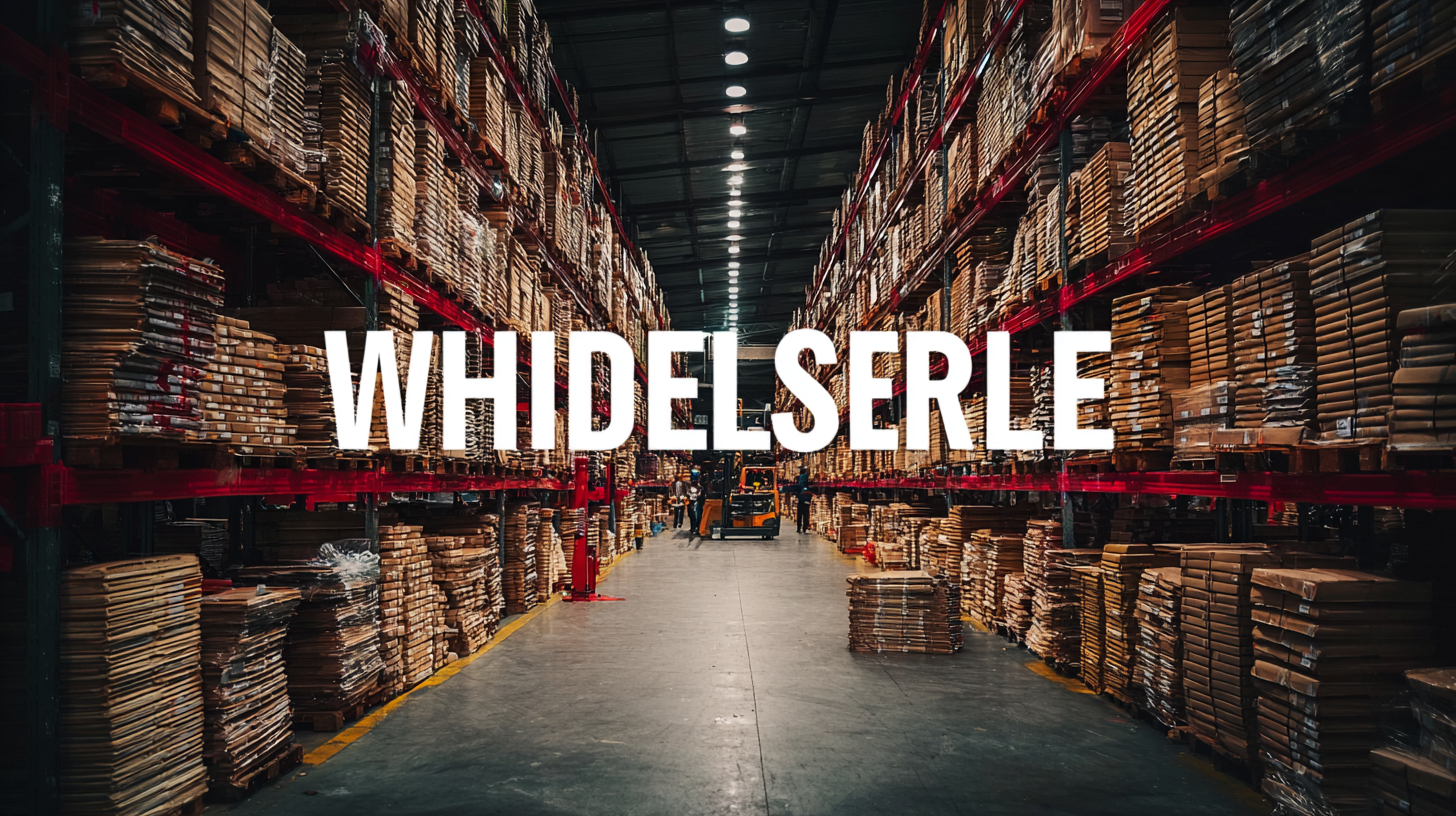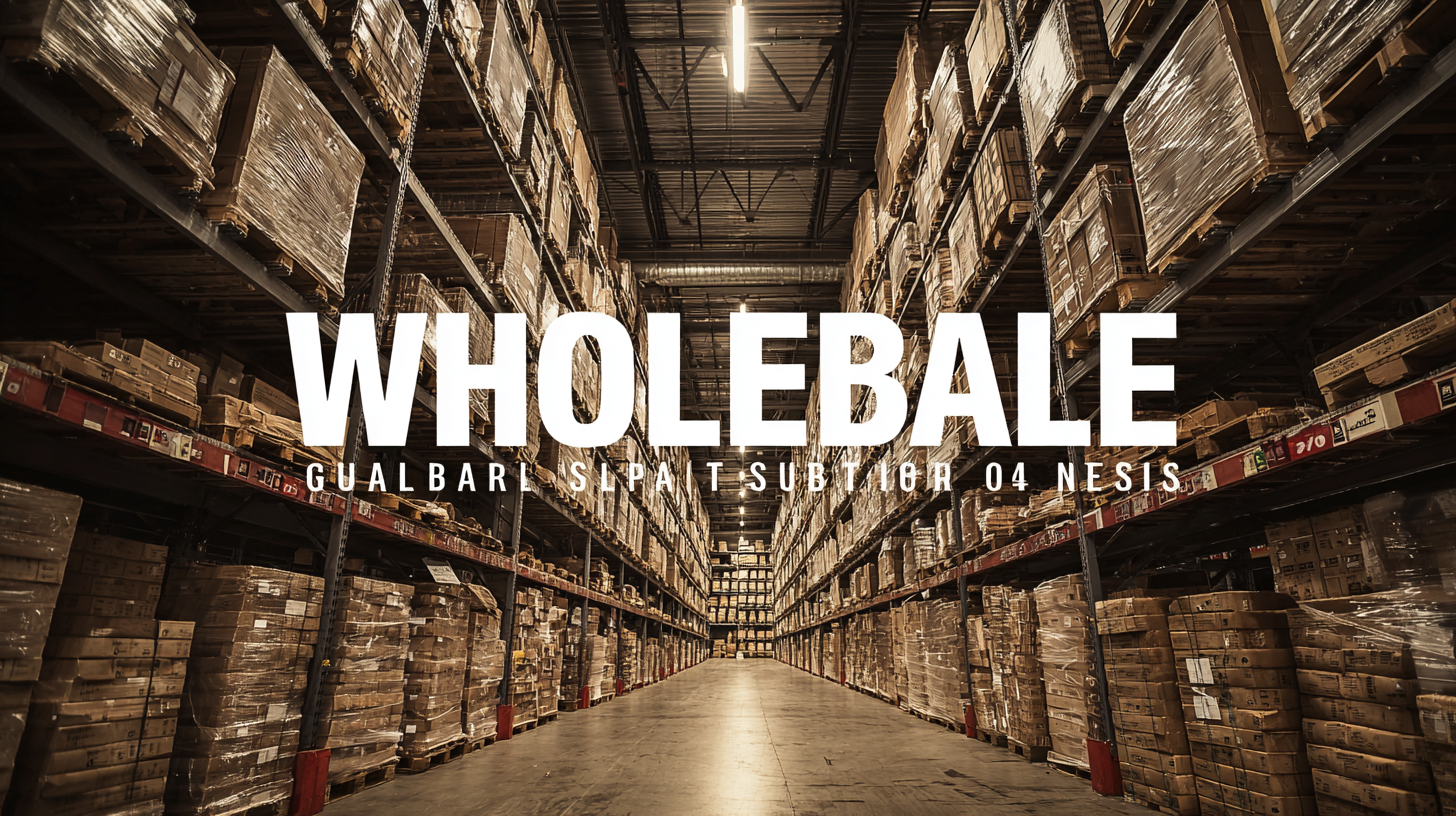
How to Identify the Best Wholesale Suppliers for Your Global Business Needs
In today's interconnected world, identifying the best wholesale suppliers is crucial for businesses aiming to thrive in the global marketplace. According to a report by Statista, the global wholesale distribution market is projected to reach approximately $6 trillion by 2025, underscoring the significance of establishing strong relationships with reliable suppliers. The right wholesale partners not only ensure cost-effectiveness but also quality and timely delivery, which are vital in maintaining customer satisfaction and competitive advantage. As businesses expand internationally, navigating the complexities of wholesale supply chains becomes essential, making it imperative to understand how to evaluate and select suppliers that align with your business needs. This guide will provide insights and strategies to help you identify and partner with the best wholesale suppliers to drive your global business success.

Identifying Key Characteristics of Reliable Wholesale Suppliers
When searching for reliable wholesale suppliers for your global business, it's essential to focus on specific characteristics that can ensure a successful partnership. Firstly, a strong supplier should have a proven track record of reliability and consistency. Look for reviews and testimonials from other businesses that highlight their ability to meet deadlines and deliver quality products consistently. A transparent communication process is also vital. A reliable supplier should be responsive to inquiries and provide clear information about their products, prices, and terms of service.

Another key characteristic is the supplier’s ability to offer flexibility and scalability to meet your evolving business needs. As your business grows, whether it’s seasonal demand fluctuations or expanding product lines, your suppliers should be able to adjust their offerings to accommodate these changes. Additionally, emphasize the importance of ethical sourcing and compliance with international standards. Suppliers who prioritize sustainability and ethical labor practices not only uphold their reputation but also contribute positively to your brand’s image. By focusing on these characteristics, you can identify wholesale suppliers who will support your business goals effectively.
Evaluating Suppliers Based on Technological Advancements in 2025
In 2025, businesses are likely to base their supplier evaluations not only on cost but also on
technological advancements that enhance resilience and reliability in supply chains.
Collaboration with partners who are investing in technology, such as automation and AI, can create
significant efficiency gains. For instance, recent reports indicate that
substantial investments are being made by leading companies in their suppliers to improve technologies.
By aligning with suppliers that prioritize innovation, businesses can better navigate the complexities of global trade.
Tip 1: Look for suppliers that are actively engaging in
digital transformation. Assess their
technologies to ensure they can adapt to changing market demands and leverage data for decision-making.
Tip 2: Evaluate the sustainability practices of potential suppliers.
With the increasing focus on environmental impacts, seeking partners who integrate
eco-friendly technologies into their operations can enhance your
brand reputation and compliance with global standards.
Innovative suppliers not only provide products but also contribute to a company's growth strategy through
technological integration and sustainability efforts. Therefore, identifying these partners
should be a fundamental aspect of your
supply chain planning.
Understanding Global Supply Chain Dynamics for Better Supplier Selection
Understanding global supply chain dynamics is crucial for identifying the best wholesale suppliers to meet your business needs. As businesses expand their operations internationally, they are increasingly exposed to complex challenges such as varying geopolitical landscapes and fluctuating economic conditions. The dynamic nature of supply chains can create risks that impact supplier reliability, making it essential to assess potential partners carefully.
For instance, recent trends have shown that manufacturing hubs like China and Mexico differ significantly in terms of risk management within their supply chains. Understanding these regional nuances allows companies to make informed decisions about supplier relationships. Furthermore, advancements in technology, including demand planning tools and logistics optimization, can enhance suppliers’ operational capabilities, ultimately benefiting businesses that understand how to leverage these tools effectively. By prioritizing transparency and resilience in supplier selection, businesses can better navigate the complexities of global supply chains and secure reliable partnerships tailored to their growth strategies.

Utilizing Digital Tools to Enhance Supplier Identification and Management
Leveraging digital tools for supplier identification and management is crucial in today’s global business landscape. Advanced automation and artificial intelligence (AI) are reshaping how companies explore and maintain supplier relationships. For instance, a recent study revealed that organizations employing AI technology in their supply chains experienced a significant reduction in operational costs, with improvements in efficiency exceeding 20%. This demonstrates the profound impact of technology on optimizing procurement processes.
Furthermore, the rise of digital twins is revolutionizing supply chain operations by providing real-time insights into supplier performance and risks. Companies can simulate supply chain dynamics, enabling them to anticipate disruptions and streamline inventory management. According to industry reports, businesses integrating digital twins into their supply chain strategy reported a 30% increase in agility, allowing for quicker adaptations to market fluctuations. As global companies increasingly adopt these digital tools, the focus on responsible data use remains paramount. By fostering transparency and trust with stakeholders, organizations can enhance supplier relationships and drive sustainable growth.
Strategies for Building Long-term Relationships with Wholesale Suppliers
Building long-term relationships with wholesale suppliers is crucial for the success of any global business. Establishing trust is the first step in forging these partnerships. Regular communication, transparency about your business needs, and a willingness to listen to suppliers can create a solid foundation. By maintaining open lines of dialogue and showing appreciation for their efforts, you can foster a sense of loyalty that benefits both parties.
Another key strategy is to negotiate terms that are mutually advantageous. This includes discussing pricing, payment terms, and delivery schedules that suit both your business objectives and the supplier’s capabilities. By working collaboratively on these aspects, you enhance the potential for a long-lasting relationship. Additionally, showing commitment through consistent orders and feedback can significantly strengthen this bond, encouraging suppliers to prioritize your business in their operations.
In summary, the focus should be on creating a partnership that thrives on fair dealings, open communication, and shared goals.
